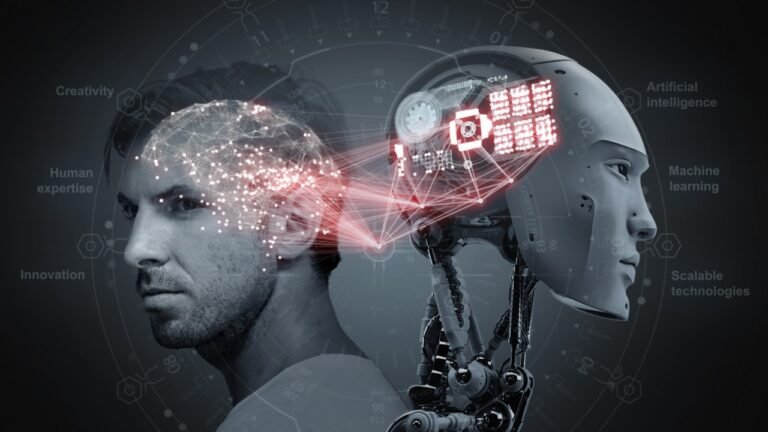The rise of Artificial Intelligence (AI) in recent times has caused much discourse in various sectors, especially those involving creativity. One question that is at the forefront is, can AI audits and writers be replaced? As the pace of technological advancement increases, one has to wonder if humans are the only ones capable of harnessing creativity. In this blog, we’ll look at The AI revolution in creativity, its possible consequences for artists and writers, and, if humans AI can outmaneuver human creativity.
What is AI in Creativity?
AI in creativity describes the application of machine learning, algorithms hyper, and neural networks in producing or improving art and literature. AI tools can create music, paint, write songs, and even invent new products. All these activities are normally referred to as creative work. However, the burning question still lingers, can AI outperform humans on these tasks owing to their originality and profundity?
AI’s Role in Art: The Digital Brush
AI art took over the art world by surprise, catching more and more attention every year DALL·E and MidJourney are able to implement beautiful pieces of art with the use of written prompts. The visual captivating potent of art provided by AI seems endless. It has given previously unimaginable collaboration opportunities to artists who can now work together with AI tools to create novel visuals. Although, many would argue that the public does not agree with the statement. AI lacks the human, personal experience, emotion and cultural touch that forms real art.
Although technically and visually striking, AI-generated art often lacks the emotion and instinct that a human artist makes in their hand work. A piece of art can only have so much meaning and relation when created from a blend of experiences, struggles, and personal stories. However, AI works throught data and patterns, meaning that it does not feel or can appreciate the underlying meaning of a piece.
AI in Writing: A New Age Writing Tool
In the performing arts sector, AI technologies such as ChatGPT are active at assisting practitioners in producing outlines, generating content, and even writing entire articles. AI is especially useful in the production of short-form content such as blog-posts, social media updates, and product descriptions. While AI can be especially helpful to writers seeking to enhance productivity or aid in overcoming writer’s block, does this suggest that AI will substitute human writers?
AI can certainly help writers do more, but it does not perform particularly well when it comes to telling stories or developing content with a specific personality. Even though AI can imitate certain writing styles, it does not understand or appreciate the level of deepness human writers employ in their writing. Human creativity is made up of one’s intuition, point of view, and emotional intelligence that cannot be matched by an AI.
Can AI Take Over the Place of Human Artists and Writers?
The answer in brief is no. While AI enhancing and assistance in the performance of creation, it is incapable of performing the creative abilities of humans. The term ‘creativity’ is not simply putting words on a paper and hoping for the best or attempting to create aesthetically pleasing pieces of work, it is about originality, emotion, and connecting.
These are a few reasons for which AI cannot replace human creativity:
- Emotional Depth: Humans can inculcate emotion into their work resulting in bonds with others that AI fails to build. Both Art and writing are subjective fields, and this emotional depth is which resonates with the audiences.
- Originality: AI functions on already existing data. It may be able to generate new combinations but truly original concepts would be impossible for it to conjure. Human imagination often deals with the notion of completely dismissing the norms and fabricating something entirely different.
- Cultural Context: Humans artists and writers are influenced by their cultures and personal history whereas AI does not possess the ability to comprehend such profound context. Creativity and machines are two words that can be put together but the latter lacks an understanding of societal trends, historical happenings or even an individual’s deeply rooted thoughts which is where they fail to provide.
- Intuition and Imperfection: At times being spontaneous can be a trait of art, this point of creativity truly parlays with imperfection. Humans possess a unique sense of timing and rhythm that is beyond the comprehension of an AI. Unlike math, art and writing require the application of risk and free imaginative thinking which invites plenty of errors.
AI as a Tool for Creators
AI should not be seen as an enemy of human creativity, but rather a tool to augment the process. Writers and artists can adopt AI to automate objectives, explore innovative concepts, and enhance their efficiency. AI technologies may be useful in assisting writers with grammar exams, coming up with ideas, or even incorporating plot twists. For artists, AI can work in as an inspiration engine providing new visual ideas, or creating different versions of pieces.
With the integration of AI in their processes, creators can improve in their art by gaining access to approaches and techniques that were once impossible. AI can assist illustrators and authors by doing the dirty work while a human does the sculpting. The repetitive work is done by the machine and the rest with human touch is left to maker.
Conclusion: The Future of Creativity
The progress that AI has made in creative spheres is fascinating and helpful, it is hard to image that it will take human artist and write away from work anytime soon. AI can work as a great assistant, but the depth and the core of the creative work is found in the being. Every artist and a writer puts their some piece of passion and emotion and their view – in the work which simply AI with so many functions cannot.
